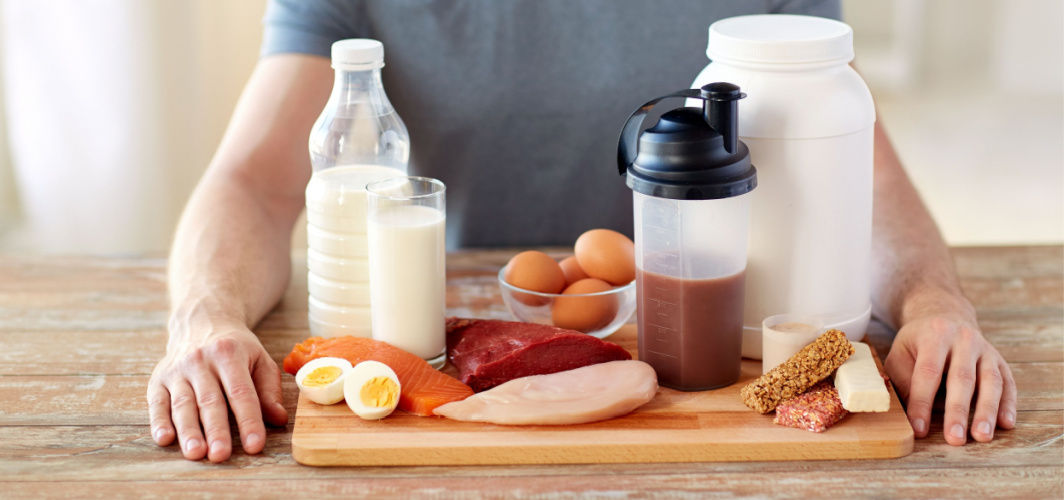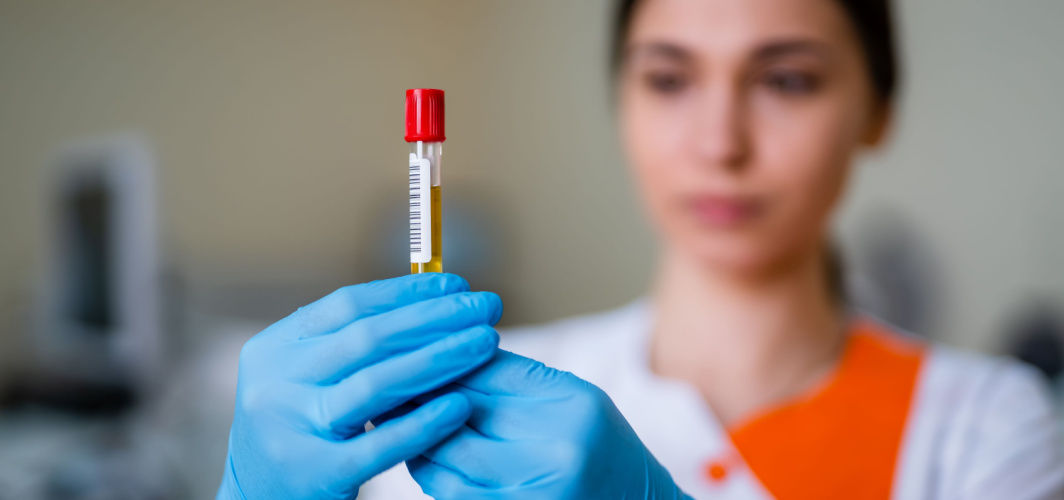General Health
The Role of Protein in a Balanced Diet: Striking the Right Nutritional Balance
8 min read
By Apollo Pharmacy, Published on - 12 September 2023
Share this article
0
0 like

Maintaining a balanced diet is crucial for overall health and well-being. Macronutrients, such as carbohydrates, fats, and proteins, play a pivotal role in providing energy and supporting various bodily functions. Protein is often referred to as the building block of life since it is responsible for repairing and building tissues, regulating enzymes and hormones, and supporting immune function. Including high protein foods in your diet is vital for maintaining muscle mass, promoting satiety and weight management, and enhancing overall health. In this article, we will delve into its crucial role in achieving a balanced diet as well as explore various sources of protein.
What is Protein?
Protein is an essential macronutrient that plays a crucial role in maintaining a healthy body. It is essential for the structure, function, and regulation of the body's cells, tissues, and organs.
1. Role in Protein Synthesis
Proteins are made up of amino acids, which are the basic units of protein molecules. These amino acids are classified into two categories:
- Essential
- Non-essential
Essential amino acids cannot be produced by the body and must be obtained through our diet. Protein synthesis is the biological process by which cells build proteins, and amino acids are the essential building blocks that make up these proteins.
2. Functions of Protein in the Body
- Building and Repairing Tissues: Protein is an essential nutrient responsible for building and repairing tissues. It aids in muscle growth and recovery, making it particularly important for individuals involved in physical activities or athletes looking to build strength.
- Enzyme Production for Metabolic Processes: Protein also plays a significant role in enzyme production, which facilitates various metabolic processes in the body. Enzymes are essential for breaking down food, absorbing nutrients, and converting them into energy.
- Hormone Regulation: Additionally, protein is involved in hormone regulation and transportation of nutrients. Hormones are chemical messengers that regulate various bodily functions. Protein helps transport hormones throughout the body and ensures their proper functioning.
Calculating Protein Requirements
Calculating protein requirements is essential to ensure you are meeting your body's nutritional needs. Let's understand the factors that may affect protein needs.
1. Age, Gender, and Weight
Age, gender, and weight play a significant role in determining protein needs. For instance, growing children and teenagers require more protein to support their rapid growth and development.
Here are some general guidelines for protein intake based on age groups:
- Infants: 1.2-1.5 grams per kilogram of body weight
- Children: 1-1.2 grams per kilogram of body weight
- Adolescents: 0.9-1 gram per kilogram of body weight
- Adults: 0.8 grams per kilogram of body weight
2. Special Considerations
Pregnant women, athletes and the elderly have increased protein needs due to the extra demands placed on their bodies. Protein is necessary for the healthy growth of the baby during pregnancy, while athletes need it for muscle repair and recovery after intense physical activity.
Pregnant and lactating women might require 1.1-1.3 grams per kilogram of their body weight.
3. Recommended Daily Allowance (RDA) for Protein Intake
When it comes to calculating protein requirements, it is important to consider the recommended daily allowance (RDA) for protein intake. The Indian dietary recommendations provide specific guidelines for protein consumption based on different age groups and lifestyles.
For sedentary individuals, the RDA for protein intake is around 0.8 grams per kilogram of body weight. However, for those who engage in regular physical activity or have a more active lifestyle, the protein requirements may be higher.
Sources of Protein for a Balanced Diet
Incorporating diverse sources of protein into your diet is essential for maintaining overall health and well-being.
1. Animal-Based Sources of Protein
- Lean Meats: Animal-based sources such as lean meats like chicken, turkey, fish, and eggs provide high-quality protein along with essential vitamins and minerals.
- Dairy Products: Dairy products like milk, yogurt, and cheese are also rich in protein and can be excellent options for meeting your daily protein needs.
2. Plant-Based Sources of Protein
Plant-based high-protein foods play a crucial role in maintaining a balanced diet. They not only provide essential nutrients but also offer numerous health benefits.
- Legumes and Pulses: Lentils, chickpeas, and kidney beans are excellent sources of protein. They are also rich in fibre, vitamins, and minerals.
- Whole Grains: Quinoa, brown rice, and oats are whole grains that contain a good amount of protein. They are also packed with other nutrients like fibre, B vitamins, and antioxidants, making them a healthy addition to your diet.
- Nuts and Seeds: Almonds, chia seeds, and flaxseeds are high in protein and healthy fats. They are also great sources of vitamins, minerals, and antioxidants. Incorporating these into your diet can offer a range of health benefits.
Healthy Meal Planning with Protein
Healthy meal planning with a focus on protein is essential for maintaining overall health and achieving specific dietary goals, such as muscle building or weight management.
1. Breakfast Ideas
Breakfast is often referred to as the most important meal of the day, and ensuring it includes an adequate amount of protein is essential for a balanced diet. High-protein breakfasts can help you feel fuller for longer, maintain steady energy levels, and support optimal muscle growth and repair.
Here are some nutritious breakfast ideas that can help you strike the right nutritional balance:
- Start your day with an egg omelette filled with vegetables like spinach, mushrooms, and bell peppers. Eggs are an excellent source of high-quality protein and essential nutrients like vitamin B12 & vitamin D.
- Greek yoghurt topped with fresh fruits is another protein-rich option. Yoghurt provides probiotics that support gut health, while fruits add fibre and vitamins.
- Incorporating high protein foods in your traditional Indian breakfasts can also be a great way to boost your protein intake. Some examples include poha made with peas or sprouts, idli with sambar, or besan chilla made with gram flour.
2. Lunch and Dinner Recipes
For lunch and dinner, numerous options can provide you with the right amount of protein while ensuring a balanced meal. Here are some ideas:
Non-Vegetarian Meal Options
- Grilled chicken breast with a side of roasted vegetables and quinoa.
- Baked fish (like salmon or tuna) served with steamed broccoli and brown rice.
- Stir-fried lean beef with mixed vegetables and whole wheat noodles.
Vegetarian Meal Options
- Lentil curry with brown rice and a side of sautéed spinach.
- Paneer tikka masala with whole wheat naan and a cucumber-tomato salad.
- Tofu stir-fry with bell peppers, mushrooms, and brown rice.
3. Snacks and Post-Workout Options
Snacking and post-workout options rich in protein can help with muscle recovery and provide sustained energy.
- Eggs are an excellent source of complete protein, containing all the essential amino acids our body needs. They are also packed with vitamins and minerals.
- When it comes to choosing post-workout snacks, it's important to opt for high protein foods instead of processed snacks. These can include protein bars, Greek yoghurt with berries, or a handful of nuts and seeds.
- These options provide the necessary protein and other essential nutrients without adding unnecessary sugars and unhealthy fats.
When to Consult a Professional
When it comes to striking the right nutritional balance in your diet, consulting a registered dietitian or nutritionist can be extremely beneficial. These professionals have the expertise and knowledge to provide personalised guidance based on your specific dietary needs and health conditions.
Additionally, if you have any health conditions that require a special diet, such as diabetes or kidney disease, a professional can provide valuable insight into how to manage these conditions while still maintaining a balanced and protein-rich diet.
Conclusion
Protein is an essential macronutrient that plays a crucial role in maintaining our overall health. It is involved in numerous bodily functions, including building and repairing tissues, producing enzymes and hormones, and supporting a healthy immune system. Ensuring an adequate protein intake is vital for optimal nutrition and well-being. There are several high-protein foods that you can include in your diet to meet your nutritional needs. Remember to consult with a healthcare professional or registered dietitian for personalised dietary advice based on your individual needs and goals.
FAQs
Q. How much protein do I need?
The recommended dietary allowance (RDA) for protein is 0.8 grams per kilogram of body weight. However, certain individuals may require higher amounts, such as athletes or those recovering from an injury.
Q. What are some high-protein foods?
There are several excellent sources of protein, both animal and plant-based. Some examples include lean meats, poultry, fish, eggs, dairy products, legumes, tofu, and quinoa.
Q. Can I get enough protein on a vegetarian or vegan diet?
Plant-based protein sources like lentils, beans, chickpeas, nuts, seeds, and whole grains can provide all the essential amino acids your body needs. Combining different plant proteins throughout the day ensures a complete protein profile.
Q. Is it safe to consume excessive amounts of protein?
While protein is important, consuming excessive amounts can strain the kidneys and lead to dehydration. It's best to follow the RDA guidelines and focus on obtaining a balanced intake from various food sources.
Q. Are there any risks associated with a high-protein diet?
High-protein diets may pose potential risks for individuals with preexisting kidney or liver conditions. Additionally, excessive reliance on animal protein may increase the risk of certain chronic diseases.
General Health
Leave Comment
Recommended for you

General Health
5 Healthy Breakfast Options With Just 5 Easily Available Ingredients Each
You need to take breakfast seriously. You can easily sprinkle some life into your daily breakfast regime by researching a few new healthy delicacies that do not require too many ingredients but will satisfy your tastebuds while maintaining good health.

General Health
5 Step Skincare Routine For Men
Discover a simple and effective 5-step skincare routine for men. Learn how to cleanse, exfoliate, moisturise, protect, and treat your skin to achieve a healthy and nourished complexion.

General Health
Leukaemia: Types, Causes, Symptoms, Diagnosis, Treatment
Leukaemia is a form of blood cancer that causes abnormal cell growth in your body. Leukaemia has two types and four main classifications. The factors affecting leukaemia include your age, gender, medical history etc. It can be diagnosed through a physical exam or blood tests.
Subscribe
Sign up for our free Health Library Daily Newsletter
Get doctor-approved health tips, news, and more.
Visual Stories

Plant-based Foods That Are a Great Source of Iron
Tap to continue exploring
Recommended for you

General Health
5 Healthy Breakfast Options With Just 5 Easily Available Ingredients Each
You need to take breakfast seriously. You can easily sprinkle some life into your daily breakfast regime by researching a few new healthy delicacies that do not require too many ingredients but will satisfy your tastebuds while maintaining good health.

General Health
5 Step Skincare Routine For Men
Discover a simple and effective 5-step skincare routine for men. Learn how to cleanse, exfoliate, moisturise, protect, and treat your skin to achieve a healthy and nourished complexion.

General Health
Leukaemia: Types, Causes, Symptoms, Diagnosis, Treatment
Leukaemia is a form of blood cancer that causes abnormal cell growth in your body. Leukaemia has two types and four main classifications. The factors affecting leukaemia include your age, gender, medical history etc. It can be diagnosed through a physical exam or blood tests.